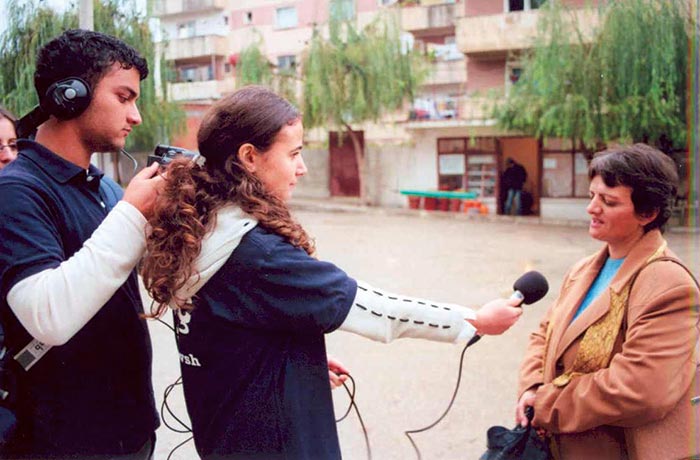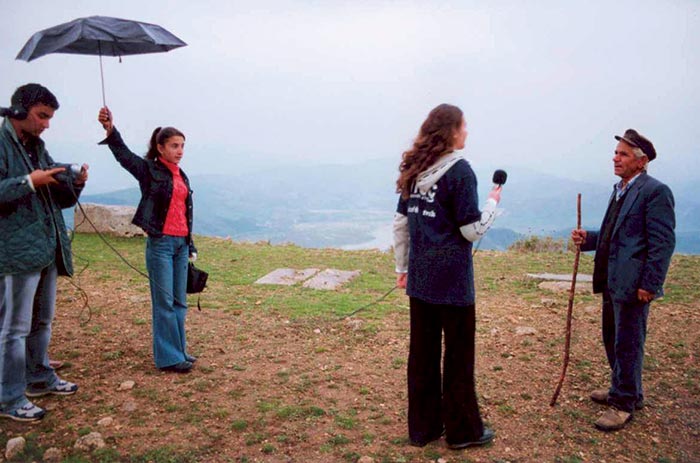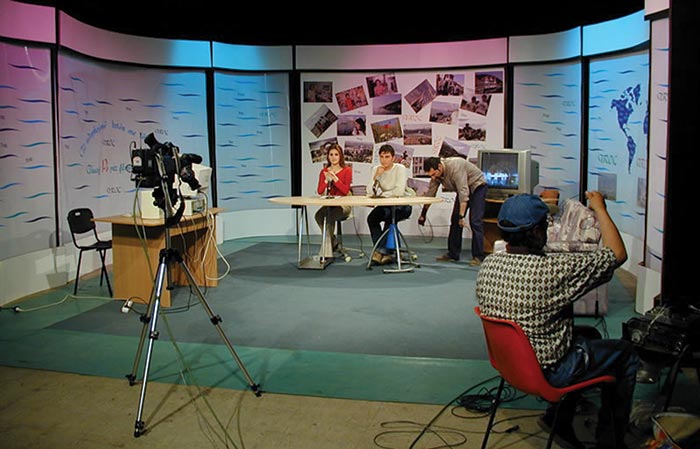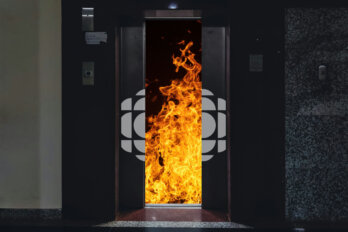
The Kou family live on a busy, muddy, potholed street in an apartment building that is missing a few walls and windows and looks as if it’s either in a state of going up or coming down. Like most other neighbourhoods in Tirana, the capital of Albania, it’s noisy with kids playing and cars bumping down the road. The family has gathered in the tiny living room of their three-room apartment on a Saturday evening—mother Krisulla, father Jovan, daughter Anna, son Kristi, and Jovan’s brother, Thimi—to watch a television show made by children.
A foreigner is present—me—so Krisulla has laid stiff organza cloths of mauve and gold over the tables. She appears from the kitchen, curtained off from the living room, with bowls of peanuts, roasted almonds, plates of pretzels, and breadsticks. She beams welcome at me, though neither of us can understand a word the other says.
Thimi watches me with quiet curiosity, then explains, through the translator, that a foreigner is something new to him: “Under the regime, if I spoke to a person like you from another country, I would have lost my job. I might even have been sent to prison.”
The show begins roughly when it’s supposed to, at 6:15, and everyone jumps for a seat. Anna turns up the volume and we turn our attention to the ninety-seventh episode of a news show made by Albanian teenagers called Troç (pronounced “trotch”), Albanian for “straight talk.” On the air since February, 2001, it is one of the most popular shows in Albania, with 44 percent of the population tuning in regularly. In a country with no history of independent media and a young population (40 percent are under nineteen), it has become the most trusted source of news.
The two hosts start off discussing a school in the south of Albania that lacks a gymnasium. A young reporter interviews students who complain they have to exercise outside, even in winter. The school principal is evasive on camera. He shrugs and talks about funds and committees and budgets. Beside me, Anna, who at fifteen displays marked cynicism about promises from people in authority, snorts with contempt.
Next up is a cultural story about a museum with Albanian artifacts dating back to the fourteenth century. This pleases the parents. Anna and Kristi both enjoy a piece about a female poet, though they complain that it’s a bit long. The hosts introduce a series of outtakes showing people who have refused to be interviewed. It’s funny watching the reporters being repeatedly rebuffed, but Jovan finds it frustrating that people won’t speak out in public.
Towards the end of the show, there is a story about the appalling condition of commuter trains carrying students and workers between the port town of Durres and Tirana. The trains are rusting and filthy, there is no glass in the windows, and winter is coming. People arrive at 5:30 a.m. to find a place on the overcrowded 7:30 train. The only decent carriages are reserved for the staff. One commuter explains that she has just started using the trains. “I’ll get used to it,” she says. My translator, Anila Miria (who also works at unicef), sighs with defeat after explaining what the girl has said: “Look at her. She’s only about twenty and already she thinks this way. She doesn’t demand that the service improve, she just thinks she should get used to it.”
Later, Krisulla brings out chocolate cake and Jovan fills our glasses with Coca-Cola. The family sits back to argue about what they have seen. “It’s important that young people are informing their peers about problems in this society,” says Jovan. “But it’s still a problem that there are some kids who don’t want to speak. They have to be convinced that they have a voice and that they should air their opinions.”
Thimi is nodding. “Under the old regime, the parents of these kids [the reporters] would have gone to prison,” he says. “Troç is good; it’s helping to educate these young people about speaking sincerely. Because we still have some problems in this nation about speaking openly.” It’s a habit, he explains, formed under forty years of Communist rule and near-complete isolation from the rest of the world. “If you ask an Albanian about the problems here, he might say that there are no problems, everything is fine. We don’t think to criticize. And this is the value of Troç. It teaches people to look critically at what’s around them.”
Albania has never had it easy. Its history, from the Roman conquest of the ancient Illyrians, through invasions by Huns, Visigoths, and Ostrogoths, and the conquest by the Byzantine Empire and the Bulgarian Tsars, is one of almost continual warfare and anarchy. In the eleventh and twelfth centuries, the Normans took a bite of Albania, and Venice claimed a piece of the coast line. The Serbians conquered it in the fourteenth century, and soon after that the Ottomans swept down on Albania, bringing the Islamic faith with them.
Just as the Ottoman Empire started to collapse in the nineteenth century, the Balkan wars started up, with everyone wanting a piece of Albania’s territory. Eventually the country was invaded by the Italians under Mussolini, followed by the Germans, followed by the bombing of Tirana by the Allies in World War II. The Albanians, fearing a land grab by the Allies at the end of the war, chose what they hoped were the protecting arms of the Soviet Union.

In 1944, Enver Hoxha became prime minister and quickly moved to redistribute land to needy peasants. During his forty-one-year dictatorship, which ended upon his death in 1985, he moved the country away from the Soviet Union and towards the Chinese, but he soon split with them, too. By the late 1970s, he was claiming that Albania was the only real socialist country in the world. During the Cold War, the fearful nation, under his brutal dictatorship, spent precious resources on up to 700,000 concrete bunkers that still dot the hillsides and coastal areas like giant, gray mushrooms.
Hoxha created a decent health-care system and widespread literacy (while permitting only Marxist propaganda to be read), though both have now slipped. But his secret police force terrorized the populace, forbade contact with foreigners, and disallowed foreign travel. He destroyed the intellectual life of the country by forcing writers and artists to work in factories and on collective farms.
Since Hoxha’s death, there have been economic reforms. By 1990, as regimes in Eastern Europe fell, Albanians took to the streets and demanded multi-party democratic elections. In 1992, the Democratic Party of Albania took power, but the leaders became bogged down in old feuds from the Communist regime. Meanwhile, gangs and criminals started taking over, there was widespread looting of military barracks, and the people armed themselves with machine guns, hand grenades, and land mines.
After the collapse of widespread pyramid schemes in 1996, when nearly every family in the country lost money, Albania fell into a state of near-anarchy. Prime Minister Sali Berisha imposed press censorship and the independent newspaper, Koha Jone, was firebombed by government agents for writing about the chaos in the streets.
After Berisha’s party was found to be involved in the illegal trade of weapons, fuel, and drugs, as well as one of the country’s biggest pyramid schemes, Fatos Nano, head of the socialist party, became prime minister of Albania. In spite of his shady reputation, Berisha is still leader of the opposition. The two can be seen on television daily, shouting insults, abuse, and accusations at each other. Their constant fighting fills pages and pages of the country’s four main dailies, constituting what largely passes for political discourse in Albania.
Surrounded by media that are obsessed with the bickering of ageing Communist-era politicians, Troç is an unexpected relief. Early on, it aired a piece on the dormitories in Tirana, where students’ rooms had no glass in the windows, huge cracks in the walls, and serious leaks. After the show aired, the director in charge of the dormitories was fired and the rooms were fixed up. While adults worried about official repercussions, the kids were thrilled that their show had made a difference.
Troç began as an after-school activity for kids, run by unicef. “The idea of Troç is to teach kids to stand up and demand their fair share in the development of the country, to influence where the country goes, and influence spending priorities,” says Catharine Way, the communication officer at unicef in Tirana. “It was to teach them critical-thinking skills, questioning, advocating for their point of view, demanding their rights. It was not meant to be teaching young journalists. But I like the idea that there might be one in each bureau who really has the passion and the talent to go out and influence the next generation of journalists.”
unicef set up a bureau system across the country and provided each with a Sony video camera and microphone. Each bureau is supervised by an adult. The kids volunteer on the show. The yearly budget is roughly $100,000 (U.S.), most of which comes from the Norwegian Agency for Development Co-operation. But local businesses are now chipping in—last year an insurance company donated $10,000 (U.S.). unicef occasionally invites foreign journalists to teach interviewing techniques and story structure, and pays a stipend to the facilitators and to the producer of the show. The show airs every Saturday evening on the state channel tvsh, and is broadcast across the entire country, reaching 98 percent of Albanian households.
The Ballsh bureau of Troç, a three-hour drive south of Tirana, is in one of the poorest areas of Albania. The kids meet in an unheated community centre that is missing a few chunks of its wall, set in a yard that looks like a construction site. I’m told it’s one of the better buildings in the village, but I’m warned to not even think about visiting the bathroom.
The facilitator, Merita Myseli, meets her ten young reporters (aged thirteen to eighteen) after they finish school, at 2 p.m. They discuss a story about a third-century-bc Illyrian settlement called Byllis. It’s a partially excavated site on a mountain nearby. The young reporters think it could be better exploited as a tourist attraction, which could help replace the industrial-oil business that is polluting their town and region. “We interviewed people who work in the factories. They are our neighbours and our parents, and they are all sick. Everyone is suffering but nothing is done,” says Klejvis Saliaj, who is sixteen. You can smell it in the air here right now and it’s very bad.”
“Byllis has the potential to change,” says today’s reporter, eighteen-year-old Anjeza Selami. “Our idea is to raise this issue so the people who can change things will consider it.” She leads the entire bureau out in the rain onto the main street, where they interview a woman heading home with her shopping, another woman selling roasted corn, four pre-teens, some men moving furniture, a group of folk musicians, and finally a shepherd with his sheep grazing on the mountain in Byllis itself. Next, they will talk to the mayor.
They have had success with other stories. After they produced a segment on serious accidents on a road without stop signs, stop signs appeared. After a segment aired about a school without lab facilities for the science students, the school built a lab.

They have enjoyed the freedom of choosing their own stories, but recently the state broadcaster intervened during the country-wide mayoral elections. Way, who worked as a journalist in New Jersey, had suggested that the bureaus each do a segment on local candidates, ask about policies, and then go back in six months to assess how well the winners had kept their promises. After airing a few segments before the elections, the head of programming for tvsh asked Troç to stop covering the elections. When Way and two colleagues went to the tvsh office to protest, however, the state broadcaster backed down immediately.
In fact, the kids at Troç seem to claim more freedom of expression than their adult counterparts. At a UN Press Club meeting held in Tirana, seven adult print and television journalists attended, but none would agree to be interviewed unless guaranteed anonymity; most of them didn’t even want their employers to know they go to the UN Press Club.
When I asked about recent stories in the New York Times and the Guardian about poor Albanians selling their children internationally, there was a long silence. Finally, a television reporter said it was easier for foreign journalists to report those stories: “They can name the politicians or the criminals involved, but we can’t. These kinds of stories are censored by the editor, who is likely a friend of the family [of the criminals or politicians] or he is afraid of them,” he says. “It’s much easier to watch the politicians accusing each other of things and then report on their fights.”
But another new television show, Fiks Fare, is also attempting to push the boundaries. Some people describe the program as being like Troç, because it probes and questions. But the show’s approach is really more like This Hour Has 22 Minutes in Canada or Michael Moore’s TV Nation in the United States.
Fiks Fare is broadcast every night on Top Channel, a private station without the reach of the state broadcaster, and not as well known as Troç. It has become notorious for showing clips of politicians making promises, followed by clips of the same politicians later contradicting themselves. The program ends with a survey of the top stories in the news. By showing how the same story in five different newspapers is presented with five different sets of facts, or how three TV newscasts feature the same laughable lack of consistency, it pokes fun at the low quality of journalism in Albania.
As with Troç, the show’s producers are finding that rather than being shut down for speaking the truth, they are being applauded for it. In fact, Troç is the only journalistic show that Fiks Fare’s hosts, Saimir Kodra and Gent Pjetri, don’t pick on.
“I was so surprised the first time I saw Troç on tvsh,” says Kodra. “Troç is raising such critical issues on state television, which was not allowed before.”
Albania is still plagued with problems: there are too many illegal weapons on the streets; the crime rate is high; the World Bank estimates a per-capita annual income of $340 (U.S.); a significant number of people say they don’t have enough to eat.
But Akil Kraja, an eighteen-year-old Troç reporter from Tirana, is hopeful. “Before Troç our world [on TV] was full of entertainment only. But then Troç started to do well, to have an effect. I was shocked when I saw the audience figures and that pushed me to do more. Then newspapers started up in our schools and they were mostly about serious issues, only a little entertainment. And then the professional media started stealing our stories.”
Kraja found that adults would stop him on the street because they recognized him from Troç. “We started to realize that journalism is a good way to talk about our problems, to solve some of our problems. I am proud that I did that,” he says. In Kraja’s view, Troç has created a more sophisticated and demanding audience, no longer satisfied with politically biased or careless reporting. And he thinks that Troç—and now Fiks Fare—are exerting needed pressure on the so-called professional media, which will have to improve or become irrelevant. “And,” he adds proudly, “we are only kids doing this.”




